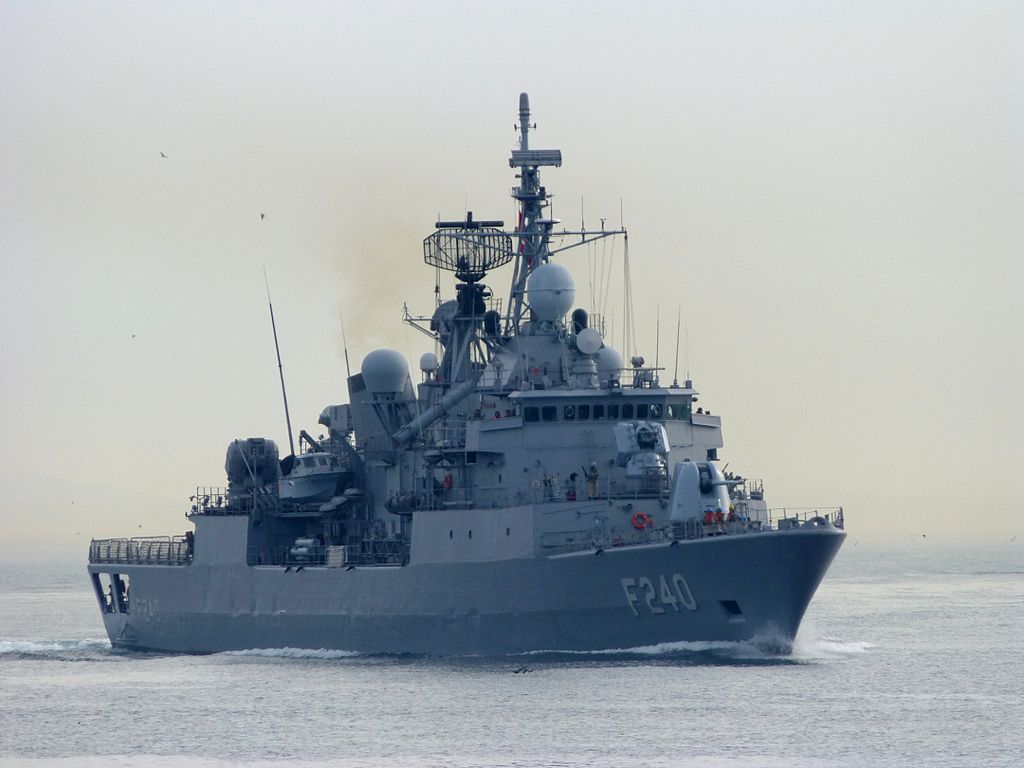
TCG Yavuz, the lead ship of Yavuz-class frigate of the Turkish Navy.
“We want the balance [in the Black Sea] not to be disturbed… If the balance is disturbed here, the probability of events getting out of control is very high.” -Hulusi Akar, Turkish Defense Minister
Turkey has seized on Russia’s invasion of Ukraine to increase its control of the Black Sea by closing it to foreign warships, stepping up natural gas exploration efforts, and holding naval exercises. The three accompanying articles from Turkish sources discuss Turkey’s actions regarding the Black Sea in these areas.
First, Turkey has closed off the Black Sea to Ukrainian and Russian warships by invoking the Montreux Convention of 1936, which gives Turkey the right to prevent warships of warring sides (other than those returning to their bases) from using the Dardanelles and Bosporus Straits during war. Accordingly, after Ukrainian forces in mid-April sunk the Moskva, the flagship of Russia’s Black Sea fleet, Russia was unable to sail its two other ships of the same class into the Black Sea to replace it. As noted in the first excerpted article from pro-government Turkish publication Hürriyet, in addition to blocking Russia and Ukraine from bringing warships into the Black Sea, Turkey has also warned its NATO Allies not to enter the Black Sea during the war in Ukraine to prevent the conflict from expanding. Turkish Defense Minister Hulusi Akar noted that this would mitigate the possibility of any rivalry and maintain the peaceful status quo in the Black Sea.
According to the excerpted article from Turkey’s Daily Sabah, as of April 2022, Turkey had dispatched its three drilling ships to the Sakarya gas field in the Black Sea to harness 540 billion cubic meters of natural gas it discovered in 2020. Russia supplies about 45 percent of Turkey’s natural gas imports, so this effort would reduce Turkey’s reliance on Russian natural gas by about a quarter when it reaches peak production. Turkey plans to start pumping gas from this field in 2023 and to increase production in the five years after that. However, this will depend on Turkey first building an offshore pipeline network and processing facilities. Turkish officials have regarded natural gas discovery in the Black Sea as an important step toward Turkey’s energy independence.
In April, Turkey also showcased its naval power during the “Blue Homeland” exercises in the Mediterranean, Aegean, and Black Seas. The article quotes President Recep Tayyip Erdoğan’s televised address the last day of exercises saying, “We will continue to work until we become the strongest army in the region with our ships, submarines and weapon systems.”
Sources:
Sedat Ergin, “Savunma Bakanı Akar’dan NATO’ya hassas Karadeniz mesajları: “Karadeniz’in dışında kalınırsa isabet olur” (Sensitive Black Sea messages from Defense Minister Akar to NATO: “It will be better to stay out of the Black Sea”),” Hürriyet (a pro-government Turkish daily),25 Nisan 2022. https://www.hurriyet.com.tr/yazarlar/sedat-ergin/savunma-bakani-akardan-natoya-hassas-karadeniz-mesajlari-karadenizin-disinda-kalinirsa-isabet-olur-42050416
[Defense Minister Hulusi Akar] reveals that Turkey made a series of suggestions to its NATO allies not to enter the Black Sea with warships during the war [in Ukraine]. The Minister does not hide the fact that Turkey’s expectation was conveyed to the NATO allies… and says:
…We want the balance [in the Black Sea] not to be disturbed… If the balance is disturbed here, the probability of events getting out of control is very high. Let’s not turn the Black Sea into a competitive environment.
Source: “Turkey to extend incentives for $10B Black Sea gas field development),” Daily Sabah (a pro-government Turkish daily), 20 April 2022. https://www.dailysabah.com/business/energy/turkey-to-extend-incentives-for-10b-black-sea-gas-field-development
Turkey will be extending government support for the massive project to develop the natural gas field it discovered in the Black Sea…
Turkey is building an industrial complex that will process the gas the country discovered in the Sakarya gas field, located some 150 kilometers (93 miles) off the coast of Turkey in the Black Sea. The facility is expected to be operational in the first quarter of 2023.
The country’s first drilling vessel, Fatih, has discovered 540 billion cubic meters (bcm) of gas in the Sakarya gas field since August 2020.
Turkey is fully dependent on gas imports, mainly from Russia, but the Sakarya field is expected to reduce those imports by about a quarter once it reaches peak production.
Ankara plans to begin pumping gas from the southwest Black Sea field in 2023 but must first build an offshore pipeline network and processing facilities.
…Expansion of the project over the next 10 years is expected to eventually lift annual production capacity to 14 bcm.
…The gas extracted from the gas field will be brought onshore through a pipeline that will be laid beneath the Black Sea.
…Scheduled to be constructed this year, the 170-kilometer pipeline will connect the wells in the region to the main grid.
The first phase of construction of the Western Black Sea Natural Gas Pipeline section will be carried out in two stages…
Source: “Mavi Vatan 2022 tatbikatı tamamlandı (Blue Homeland 2022 exercises completed),” NTV (a pro-government Turkish news channel),21 April 2022. https://www.ntv.com.tr/turkiye/mavi-vatan-2022-tatbikati-tamamlandi,9-YP3y3e4EWPSlU1jcnlng
…Participating in the Blue Homeland exercises through a live broadcast, President Erdoğan said: “We will continue to work until we become the strongest army in the region with our ships, submarines and weapon systems.”
Blue Homeland exercises… in coordination with the personnel in the Black Sea, Aegean and eastern Mediterranean, concluded successfully. Airplanes, ships and our personnel have shown that they are always ready for the exercise.
It is imperative for Turkey to have a strong naval force. We attach special importance to developing our naval forces in terms of equipment and personnel and to make the highest contribution to the defense of the homeland.
We will continue to work until we become the strongest army in the region with our ships, submarines and weapon systems.
Image Information:
Image: TCG Yavuz, the lead ship of Yavuz-class frigate of the Turkish Navy.
Source: Nevit Dilmen, Own Work, via Wikimedia,
https://commons.wikimedia.org/wiki/File:Istanbul_1000146_Nevit.jpg
Attribution: CC-BY-SA-3.0 | GFDL | Self-published work
